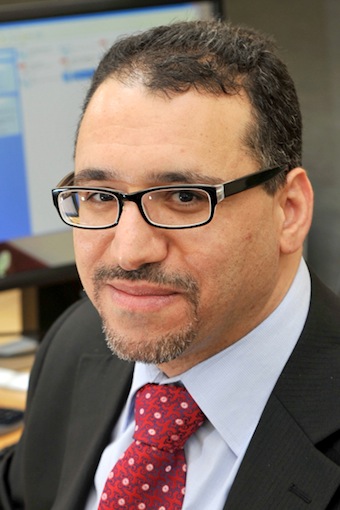Grand Rounds warns of MENA hepatitis C crisis
July, 2015

Dr. Laith Abu-Raddad, associate professor of public
health at WCMC-Q.
The impact of the hepatitis C virus on the MENA region was discussed in the latest installment of WCMC-Q’s Grand Rounds.
Dr. Laith Abu-Raddad, associate professor of public health at WCMC-Q, described the historical spread of hepatitis C in the Middle East and North Africa and discussed the latest therapies and public health efforts aimed at controlling the debilitating virus.
The Grand Rounds, developed by WCMC-Q’s Division of Continuing Professional Development, provides a platform for expert speakers to engage with healthcare professionals in the community to disseminate knowledge of the latest developments in medical technology, research and best practice.
Speaking at WCMC-Q to an audience of physicians, researchers, students and healthcare professionals, Dr. Abu-Raddad explained: “The disease burden of viral hepatitis worldwide is comparable to other serious diseases such as HIV/AIDS, tuberculosis and malaria.
“It is one of the important threats to global health, and the Middle East and North Africa has the highest prevalence of hepatitis C virus of any region in the world.”
Hepatitis C is a blood-borne virus that is most commonly spread by the use of inadequately sterilized medical equipment, transfusions of contaminated blood and by unsafe practices such as sharing needles/syringes. The virus can also be transmitted from mothers to their children during pregnancy, childbirth and the postpartum period. There is no vaccine for hepatitis C.
If untreated, hepatitis C can cause severe liver cirrhosis, which in some cases leads to liver cancer and death. Up to 150 million people worldwide are believed to have hepatitis C and 350,000 to 500,000 die each year from hepatitis C-related liver disease. Egypt has the highest rate of hepatitis C infection in the world, with 14.7 percent of the population carrying the virus. Infection rates are relatively low in the Gulf region and in Qatar 1.1 percent of the population have the virus.
Dr. Abu-Raddad said the hepatitis C disease burden is growing but that new hope emerged just over a year ago when the world’s first truly effective hepatitis C drug was launched. Unfortunately, the new drug comes with an eye-watering price tag of $84,000 for a full 12-week course.
Dr. Abu-Raddad said: “We now hope that the price of this new generation of medications will fall considerably so that these drugs can be made available to large numbers of people, which has already started to happen. In Egypt, for example, the government was able to negotiate a large discount on the drug and has begun a program that has so far treated more than 400,000 people.
“Other countries are developing their own programs and I am very hopeful that in the future we will be able to dramatically reduce the incidence and prevalence of hepatitis C in the MENA region, relieving many people from the misery of the disease.”
Dr. Ali Sultan, associate professor of microbiology and immunology, said: “Dr. Abu-Raddad’s research and his lecture has demonstrated just how great a threat hepatitis C poses to public health in our region and across the globe. We are very pleased that our audience at Grand Rounds had the opportunity to learn about the virus and the efforts that are underway to wipe out the disease.”
